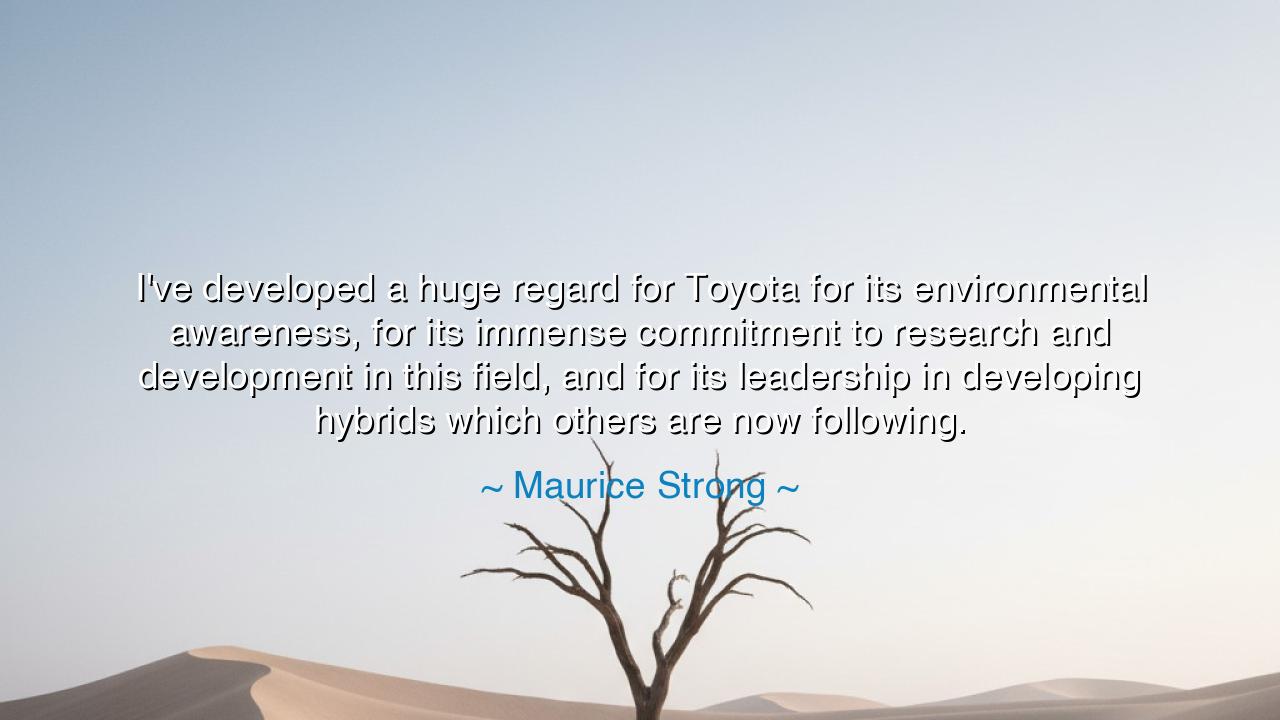
I've developed a huge regard for Toyota for its environmental
I've developed a huge regard for Toyota for its environmental awareness, for its immense commitment to research and development in this field, and for its leadership in developing hybrids which others are now following.






In the thoughtful and visionary words of Maurice Strong, we encounter a truth that stretches beyond commerce and technology — a truth about responsibility, foresight, and the moral duty of innovation: “I’ve developed a huge regard for Toyota for its environmental awareness, for its immense commitment to research and development in this field, and for its leadership in developing hybrids which others are now following.” Though he speaks of a company, Strong is in fact speaking of a philosophy — a way of seeing progress not as conquest over nature, but as cooperation with it. It is the call of the wise to those who build the future: that invention must not serve greed alone, but the preservation of the earth that sustains us all.
To understand the origin of this quote, we must know the man who spoke it. Maurice Strong was no ordinary industrialist or diplomat; he was one of the architects of the modern environmental movement — the first Secretary-General of the United Nations Conference on the Human Environment in 1972, and later, a leader in the creation of the Earth Summit in Rio de Janeiro in 1992. He lived at the crossroads of industry and ecology, believing that human progress and planetary stewardship need not be enemies. When he praised Toyota, he was recognizing in that company a kindred spirit — a rare example of a modern enterprise that sought not only profit, but balance, not only efficiency, but sustainability.
The heart of Strong’s praise lies in one word: leadership. True leadership, he reminds us, is not the mere act of being first — it is the act of leading wisely, with purpose beyond personal gain. When Toyota introduced the hybrid car, beginning with the Prius in the late 1990s, it did more than launch a product; it altered the course of an entire industry. At a time when the world’s engines ran on oil and indifference, Toyota dared to blend electricity and gasoline, efficiency and performance, innovation and restraint. It was a humble revolution — quiet, clean, and disciplined — the kind that reshapes civilization not through destruction, but through example.
Strong’s recognition of Toyota’s commitment to research and development is a reminder that knowledge, when guided by conscience, becomes one of humanity’s highest virtues. The ancients knew this well. When the philosopher Plato wrote of the “philosopher-king,” he imagined a ruler who governed not for power but for wisdom — one who studied the stars not to dominate them, but to understand his place beneath them. In the same spirit, Toyota’s engineers, guided by long-term vision rather than short-term profit, chose to learn from the natural order — to create machines that consumed less, wasted less, and harmed less. Their laboratories became, in a sense, temples of ethical inquiry — proving that even in the age of steel and circuitry, mankind could still act as caretaker, not conqueror.
The meaning of this quote extends far beyond the automotive world. Strong is speaking to the eternal relationship between innovation and morality. Every age has its tools — the wheel, the forge, the engine, the chip — but few ages remember that tools are only as noble as the hands that wield them. The tragedy of the modern era is that technology has often run faster than conscience. Yet here, in Toyota’s work, Strong saw the spark of redemption: a vision of industry that learns from nature instead of wounding it. He reminds us that progress must not be defined by how much we can build, but by how responsibly we build it.
There is an old story from Japan, the land of Toyota’s birth, that captures this wisdom. When the master swordsmith Masamune forged a blade, he was said to cool it not in blood, but in flowing water — so that it would reflect both strength and serenity. His rival, Muramasa, quenched his swords in violence, and though they cut more fiercely, they brought misfortune to their wielders. The legend teaches that the greatest craftsman is not the one who makes the sharpest weapon, but the one whose creation brings harmony. So it is with Toyota, and so it is with all who would shape the future: we must forge not for domination, but for balance.
The lesson of Strong’s words is clear and timeless. Leadership, whether in industry, science, or government, demands the courage to look beyond the moment and act for the generations yet unborn. To be truly great is not to outpace one’s rivals, but to outgrow the narrowness of self-interest. Each of us, in our own sphere — whether building machines, raising children, or tending the soil — carries a piece of this responsibility. We must all ask, before every act of creation: will this bring the world closer to harmony, or drive it further toward decay? For in the answer lies the measure of our wisdom.
Thus, let Maurice Strong’s words stand as a beacon to all who build and lead. Let us, like Toyota, unite knowledge with conscience, innovation with reverence. Let us honor the earth not with words but with the works of our hands — engines that breathe lightly, systems that heal, lives that give more than they take. For the future does not belong to those who consume it, but to those who cultivate it. And if we are to endure as a species, we must remember that the greatest invention of all is not the machine, but the mind awakened to its duty toward the living world.






AAdministratorAdministrator
Welcome, honored guests. Please leave a comment, we will respond soon